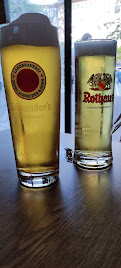The subject of cask conditioned beer is a complex and broad one and to tackle it, Des De Moor has written a comprehensive and extensive book about it. At 334 pages, it covers a wide array of beery topics,...
The subject of cask conditioned beer is a complex and broad one and to tackle it, Des De Moor has written a comprehensive and extensive book about it. At 334 pages, it covers a wide array of beery topics, presented as a series of chapters with subject titles and a narrative about each.�
�Let's start with the introduction in which the author sets out his aims and objectives, which, broadly, are to describe the product and its history and to fill in gaps that may not be covered elsewhere. It's a big ask and a look at the bibliography and list of those spoken to or interviewed shows the seriousness with which the subject has been approached, and here is the first observation. This is rather serious book. Didn't all those interviewees have some good stories to relate as well as words of wisdom?
At the beginning of the book, the author, in his first paragraph, sets
out why cask beer is "unique" and" unmatched by any other".�� He
concludes by quoting Mark Dorber, a cellarman of some repute, about what
we'd lose if we lost cask beer, which is the joy of being in touch with
something living.� These are both sets of wise words, and neatly and
succinctly bookend the content between them, and are probably the most important sentences in the book.
In many of the following chapters there is an inevitable crossover to beer history and to the techniques of brewing and if you are not already familiar with the art of brewing, these will be of interest, as are the explanations of cask size, filling, returning and the many aspects that make cask beer different from keg or other beer.� The chapters on cellar keeping are meticulous in their accuracy and are recommended as pretty much definitive, though on the downside, may inadvertently give the reader the idea that cask is a much more complicated beast than it is, a possible problem if you are already inclined to think of cask as a difficult to deal with. Whatever your point of view, you will certainly learn a lot about cask beer from these chapters.
There are also strong chapters on what makes cask, cask, and cask beer styles, flavour and taste, though a tendency to over explain creeps in, for example by discussing at fair length beers that should never be presented in cask form.� (Though it is good to say that not all beer suits cask conditioning).�
Controversial subjects include unfined beer and acceptable levels of haze, but skate over the potential damage done to traditionally clear cask beer that gave rise to the doubtful response, often given to punters in the pub, "It's meant to be like that" even when that isn't so.� Rightly the effect of poor presentation is discussed and the difference between live beer and cask beer, which causes no end of difficulties within CAMRA and elsewhere is mentioned, as is the rise of craft beer and its inevitable effect on cask.� The chapters on food and cask beer outside the UK are probably unnecessary, and much of the history could do with a sharper edit. In fact, this is a theme throughout, as the book itself is probably overall a bit too long.
Moving on to recent history and the future of cask, while merger mania is discussed and the Beer Orders mentioned, there is little reference to just how far the cask beer revival had come in the late 1970s and 1980s where throughout the country, both regional brewers such as Greenall Whitley, Shipstones, Morland and many national brewers, particularly Allied (who set up separate cask chains such as Walkers on Merseyside and Holt Plant and Deakin in the Black Country) were pumping out vast quantities of cask beer. Others large brewers like Courage also produced cask in volume. With Independent Family Brewers still flying the cask flag, as they do now, the rise of lager apart, this was peak cask and more could be made of it in the book.�
Then cask beer was mainstream and most that drank it just thought of it,
if they thought of it at all, as beer. Not cask beer, not traditional
beer, but just beer. And peak cask continued until the Beer Orders
separated pubs from brewing, with dire consequences for both cask and
the beer industry; a separation which still casts a long shadow today.
The author recognises this as the law of unintended consequences, but he
could have expanded, to good effect, the devastating effect on cask
beer production and subsequently on beer quality, the cost of a pint and
much more.�
As I mentioned before, we get little by way of a look at cask beer from the consumer point of view. Where are the uplifting stories from pubs, brewers and importantly drinkers? While craft in its current form may be the younger drinkers' discussion topic of choice under railway arches, cask has always been the social lubricant of the traditional pub goer, to whom the beer is important as an accompaniment to fun, rather than the fun itself - particularly when you could simply ask for bitter, and depend on your local pub or brewery to supply you with a decent pint. What happened to these famous cask beers such as Bass, Ind Coope Burton Ale, Tetley Bitter, Boddingtons and more, that you could depend on?� We could have been told, and a few anecdotes and a bit of background would have lightened and balanced the book.
Referring to the future, there is the unanswered question that if cask is in dire trouble as production figures suggest, why does it thrive in, for example, the likes of Sheffield, Manchester, Liverpool, Derby, Nottingham - and even rural Lancashire and Yorkshire? Can we not learn lessons from them? The question is mentioned, but not explored, though one solution mooted strongly is that the answer to cask's woes is to charge more for the product. This unconvincingly overlooks the fact that brewers are the last to see much of any price increase, and that cask succeeds in the places mentioned, as do the many small brewers that supply it. Perhaps the cost of cask beer, however it is priced, is both a strength and a weakness? A dichotomy that will never be resolved?
These points, however, don't detract from this comprehensive book. It is a very valuable contribution to any beery type's library, and useful for those that want (nearly) everything they need to know about British cask beer in one place. What is perhaps missing though is the affection, romance, intensity and the human interactions that many would say is the hallmark of cask beer, but as a more serious look at the subject, it succeeds in bringing together, the technical aspects over the more ephemeral and nostalgic.�
Reviewer's note. This isn't an entirely neutral review. Where cask is concerned, I have skin in the game. After all, I have been supping it for nearly 45 years and stopped many a firkin going sour over my time.� Whatever happens to cask beer, it will see me out, thankfully!
Disclosure: My review copy of the book was supplied by CAMRA Books, from whom this excellent book can be purchased. (CAMRA Members discount is offered too.)













